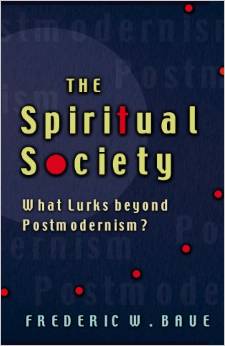Frederic Baue: The Spiritual Society
 Frederic W. Baue, The Spiritual Society: What Lurks Beyond Postmodernism? (Wheaton, IL: Crossway Books, 2001), 192 pages, ISBN 9781581342536.
Frederic W. Baue, The Spiritual Society: What Lurks Beyond Postmodernism? (Wheaton, IL: Crossway Books, 2001), 192 pages, ISBN 9781581342536.
The Spiritual Society by Frederic Baue is a timely book. It addresses the contemporary worldview that has been frequently described with the elusive term “postmodernism.” The author, formally trained in theology and English literature, observes indicators in contemporary culture that paint a picture of a future society which is in many ways “spiritual” but by no means “Christian.” In Baue’s view, what we call “postmodern” is, in fact, not the designation of a future spiritual age; it is a transitional period between the modern era and the coming age. Moreover, by observing the cultural indicators of this transitional phase, the author proposes a vision of the future that might help Christians to prepare for the spiritual challenges ahead.
Baue’s projection of a future age—seemingly religious but openly hostile toward Christian faith and doctrine—reads like a commentary on John Courtney Murray’s The Problem of God Yesterday and Today. Murray’s seminal description of the postmodern age, published in the 1960s, examines the early development of a society that rejects Christian doctrine and considers the very existence of God a menace to human freedom. Although Baue’s perspective is decidedly Lutheran, and the reader will find little interaction with other Christian traditions, Baue’s observations form an insightful analysis of the postmodern period and a stimulating update to Murray’s publication. It is therefore up to the reader to engage Baue’s North American Lutheran perspective in further dialogue with other Christian traditions and cultures.

Rev. Frederic W. Baue, STS, Ph.D., is a minister of the Lutheran Church (Missouri Synod).
Nonetheless, even the casual reader will find Baue’s observations descriptive of much of the present situation. The New Age movement, influences of Hinduism, Buddhism, Taoism, and Paganism, combined with a secular mythology, cultic ideology, or Native American spirituality, are just a few of the contemporary benchmarks that continue to undermine and challenge a Christian worldview. Many Christians are unaware of this counter-culture or choose not to engage in it. While the latter is commendatory, Baue advises his readers not to be ignorant of the current situation and calls the Church to stem against the tide of secularism and false spirituality.
Baue draws his inspiration from the work of Pitirim A. Sorokin, a Russian-born sociologist who founded Harvard University’s Department of Sociology in the 1930s. Although influential in his day, contemporary sociologists have largely neglected Sorokin’s perspective, which views the development of Western civilization as oscillating between two major cultural systems: the “Sensate,” periods when material values predominate, and the “Ideational” or “Christian,” times when spiritual values prevail. In Baue’s view, the transition between these two recurring systems can be discerned throughout modern and postmodern history, and a careful observation of Western society reveals—in his opinion—an unsettling vision of the future.


